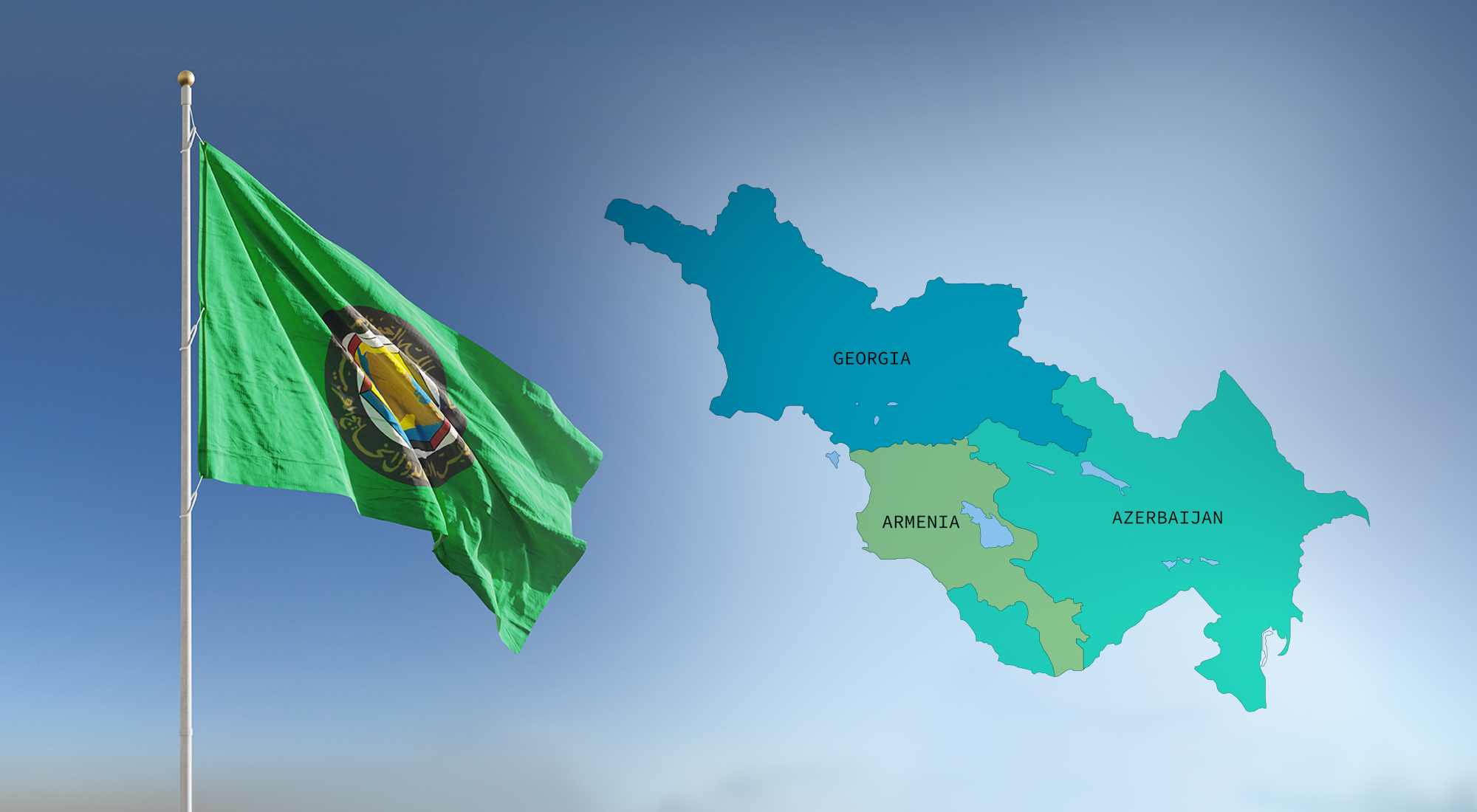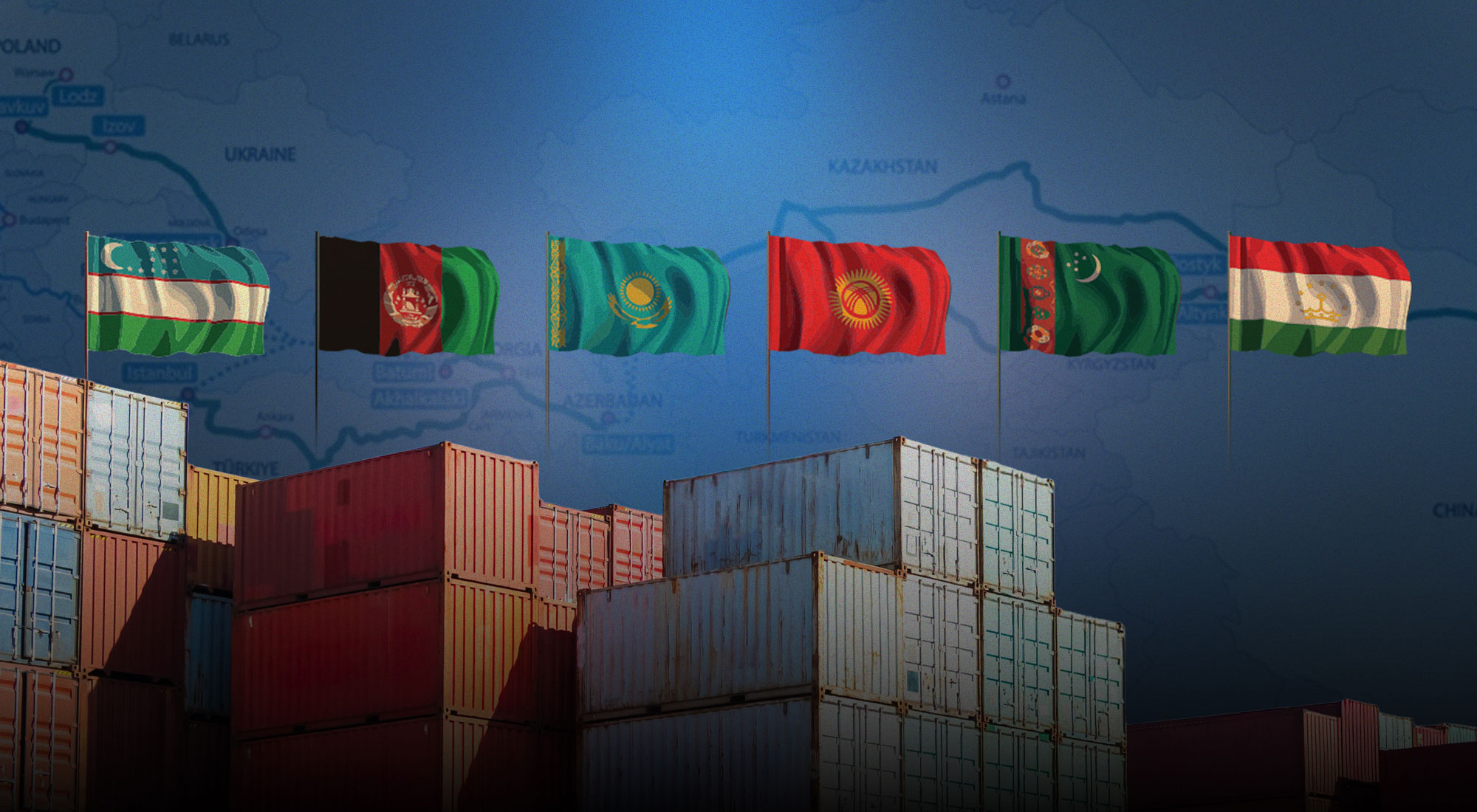In the age of the emerging multipolar world, countries in Eurasia seek to diversify their long-held foreign ties. Entire regions, seemingly distant from each other, now aspire to build closer ties to develop economic and investment relations, which ultimately translate into active geopolitical engagement. So far, little has been written on the subject of expanding cooperation between the South Caucasus and the Gulf Cooperation Council (GCC). Yet the relations are promising, and this paper seeks to fill in this gap by explaining the rationale behind the expanding trade and investment ties by looking at the wider geopolitical context.
Significance of the South Caucasus for the GCC
Traditionally, the South Caucasus might not have been an important region for GCC states—Saudi Arabia, Kuwait, the United Arab Emirates (UAE), Qatar, Bahrain and Oman. The two regions are geographically separated, and economic and investment opportunities in the South Caucasus have not been especially promising for the countries of the Gulf region. Moreover, since the end of the Soviet Union, the South Caucasus was engulfed in the Russia-West competition and the bigger actors, along with Turkey and, to a certain extent, Iran, left little room for the Gulf countries to expand their footprint in the region.
Yet recently, this started to change. Firstly, it is about the growing importance of the South Caucasus in the international arena. The war in Ukraine rendered the region more interesting to outside actors because of the expanding Middle Corridor—a route that runs from the Black Sea and Turkey via Georgia and Azerbaijan to Central Asia and western parts of China. The corridor thus constitutes the shortest land route between the EU and China—the two largest economies on the continent.
Yet another geopolitical novelty is that since Russia remains bogged down in the steppes of Ukraine, the Kremlin is increasingly less able to exert its erstwhile level of influence elsewhere. The South Caucasus benefits from this shift or Russia’s managed decline. Armenia, Azerbaijan, and Georgia now have greater room for maneuver to build what is nowadays fashionable to call multi-vector foreign policy—the pursuit of multiple partnerships in an effort to diversify trade, political and security ties.
Georgia
Since early 2010, Georgia has been actively promoting its economic and investment interests with the GCC states. Though the GCC states still seem reluctant to invest billions, there are wider geopolitical reasons that underscore their gradually expanding interests in Georgia’s and generally the South Caucasus’ nascent energy and transport corridor.
There have been steps to invigorate Georgia’s relations with the regional actors, while separate embassies were opened in Qatar and Saudi Arabia, and the decision to establish a diplomatic mission in the UAE was announced. Additionally, the GCC countries have always supported Georgian sovereignty and territorial integrity amid the effective occupation of 20 percent of Georgian territory by Russian troops since 2008.
Georgia is becoming increasingly attractive for citizens and expats of the GCC countries who come as tourists, private visitors, and entrepreneurs to diversify their leisure and seek new possibilities for investments. A crucial step was the liberalization of the visa regime between Georgia and the GCC states, which resulted in an increase in visitors. In 2016, 30,000 tourists from Saudi Arabia visited Georgia, a 116% increase over the previous year. Overall, more than 60,000 tourists visited Georgia from the GCC countries in 2016, which is a 65% increase compared to 2015. In 2017, 106,000 GCC member state residents traveled to Georgia, the majority from Saudi Arabia. In 2022, Georgia welcomed nearly 120,000 tourists from Saudi Arabia (a 100 percent increase from 2021).[1]
There have also been multiple high-level visits by GCC heads of state and government since 2014-2015, which have allowed for the expansion of trade and investment relations. Moreover, successive visits of Georgian high officials over the last decade to the GCC countries served the purpose of reaffirming Georgia’s desire to enhance cooperation with these countries and provide a favorable environment for bolstering economic and business relations and increasing investments in the Georgian economy.
Moreover, in addition to existing free trade agreements with the EU, China, Turkey, and Central Asian countries, Georgia has proposed the idea of having similar deals with the UAE and Saudi Arabia. As the Georgian officials claim, the talks are ongoing.[2] The talks follow the signing of an agreement on “comprehensive economic cooperation” with the UAE in October 2023. The “Comprehensive Economic Partnership” or CEPA envisages tariff-free exports from Georgia to the UAE for well over 97.5% of Georgian products.[3] The measure is set to facilitate the expansion of trade, which in 2022 bilateral trade stood at more than 400 million dollars and, compared to the previous year, more than doubled.[4] Given the fact that Georgia’s trade with the UAE accounts for more than half of the total trade with the GCC,[5] the signing of CEPA with the UAE seems reasonable. Moreover, with a GDP growth of over 4 percent a year (forecast for 2024), Georgia is among the top 10 countries in the World Bank’s Doing Business rankings, which serve as a powerful tool to attract investments from the UAE and the GCC in general.
In January, Georgia and Saudi Arabia signed an agreement on the establishment of an Intergovernmental Coordination Council, which envisages the creation of working groups that will hold meetings and consultations on issues of common interest.[6]
Later in February, Tbilisi hosted the Georgia-Saudi Arabia business forum, where around 300 delegates from Georgia’s and Saudi Arabia’s businesses and governments gathered to discuss bilateral relations.[7] During the event, four agreements on industry, energy, and culture were signed with the goal of developing water and solar energy projects.[8]
There is also a geopolitical context to Georgia-GCC cooperation. The GCC states look at the South Caucasus as a continuation of the Central Asian corridor. Together, these two regions make up a critical road and rail link between larger world markets such as Europe and China. Quite naturally, the GCC states want to tap into many economic opportunities stemming from the nascent South Caucasus corridor. Indeed, numerous pipelines, railways and roads built in the past 30 years have gradually transformed the region into a potentially global transportation corridor.
Therefore, the GCC countries are particularly interested in Georgia’s transit role, and the prospects of investing in the development of the transit corridor are always discussed. Road, railway, and Black Sea port infrastructure are of primary interest for the GCC countries, and they hope that further progress will be made by Georgia in the development of its transit potential, especially given Tbilisi’s ambitions to build the deep sea port of Anaklia. For the simple reason that the GCC countries view the country and the South Caucasus as yet another, perhaps complementary, road to the European market.
Consider the following example, even before 2014, the UAE bought the port of Poti in 2008. The company was the Ras Al Khaimah Investment Authority (RAKIA). The port was then sold in 2011, but RAKIA’s actions were a reflection of the GCC countries’ interests.
There is a large potential for deeper economic cooperation between Georgia and the GCC countries, but trade relations still lag considerably behind what could be achieved. For example, non-oil trade between the UAE and Georgia by 2019 reached a couple of hundred million US dollars. The same goes for Saudi Arabia. Since the Georgian Embassy was opened in Saudi Arabia in 2015, economic relations have dramatically increased by a staggering 360%, but overall the numbers are low.
Azerbaijan
Azerbaijan has enjoyed far closer ties with the GCC due to its significant oil and gas sector and generally bigger involvement in the Middle East (for example, expanding military and political ties with Israel and a stable, but overall tense relationship with the Islamic Republic). Azerbaijan-GCC relations are expanding primarily in investments and trade, facilitated by the approved Joint Action Plan 2024-2028, which involves the pursuit of joint investments and the expansion of trade.[9]
In 2012, the State Oil Company of the Republic of Azerbaijan and the Saudi company Soroof International reached a deal on investments in the oil and gas sectors of the South Caucasian country. Riyadh also invested $300 million in the wind energy industry in the Absheron-Khizi.
More recently, Azerbaijan has expanded ties with other GCC countries, namely the UAE. In December 2023, a partnership between the UAE and the Republic of Azerbaijan led to the launch of an investment fund valued at one billion dollars. A joint effort between the Azerbaijan Investment Holding and the Abu Dhabi Investment Company consists of each entity owning an equal 50% share of the fund.[10] The investment fund will focus on a wide array of projects in clean energy, agriculture, pharmaceuticals, and technology, covering the South Caucasus and parts of Central Asia.
Two months prior to this announcement, the Emirates-based entity “Masdar” introduced a solar power plant in the Republic of Azerbaijan, which cost $262 million and has a capacity of 230 megawatts. The company also reached agreements for the establishment of two solar and one wind project in the South Caucasus country with a total capacity of one gigawatt. Saudi Arabia’s “Acwa Power” committed tens of millions of US dollars for the development of a 230-megawatt wind power plant in Azerbaijan. Baku expects that the produced electricity can then be sold to international buyers at higher prices during periods of peak demand.
The Abu Dhabi National Oil Company (ADNOC) also invested in the Azerbaijani energy market, securing a 30 percent share in the Caspian Sea’s Absheron gas field.[11] With the first phase initiated in 2023 under Total’s operation and the second phase expected by 2027, the field is projected to supply six billion cubic meters of gas annually to European markets upon reaching full production capacity.
In January, H.H. Sheikh Mohamed bin Zayed Al Nahyan, the President of the UAE, visited Azerbaijan, where the two sides discussed economic and energy partnership. The two also reached a Memorandum of Understanding (MoU), which aims to hasten the development of Azerbaijan’s digital infrastructure.
The 2022 data highlight the Gulf countries as some of Azerbaijan’s leading investment sources, although reciprocal investments and bilateral trade levels vary but are mostly relatively modest when compared to those from Azerbaijan’s other partners, such as Turkey. For example, in 2023, trade between Azerbaijan and Saudi Arabia stood at $30 million.[12] In contrast, bilateral trade between the UAE and Azerbaijan in 2022 stood at $980 million and is expected to increase in the coming years.[13] The two countries also enjoyed a visa-free regime from mid-2023, and in 2022, 42,000 UAE tourists traveled to the South Caucasus country.[14]
Following the outbreak of the war in Ukraine in early 2022, the collective West sought alternative clean energy sources. Azerbaijan has positioned itself as a key beneficiary of this shift toward the green energy revolution. Utilizing the increased revenue from oil exports, the Aliyev government has funded numerous green energy projects.[15] As a result, the UAE and Saudi Arabia have shown interest in Azerbaijan’s green energy potential, committing to invest in solar and wind projects in Karabakh and Azerbaijan’s northern territories. The above-mentioned deals between the UAE’s “Masdar” and Azerbaijan, as well as Saudi Arabia’s “Acwa Power” and SOCAR, are relevant to these wider shifts in energy development.
Azerbaijan’s efforts to be seen as a dependable energy supplier align with its broader strategy of economic diversification and establishing strong ties with the Gulf countries, reducing reliance on cash inflow from the West amidst diplomatic tensions with some European countries following the fall of Nagorno-Karabakh in September 2023.
Armenia
In November 2023, Armenia and Saudi Arabia established diplomatic relations.[16] This was a culmination of a long-drawn process of gradual approximation of interests. In 2021, the president of Armenia, Armen Sarkissian, visited Saudi Arabia. A year later, at the Munich Security Conference, a meeting between the foreign ministers of the two countries took place. In 2023, Armenia and Saudi Arabia agreed on opening commercial flights.
Armenia too seeks investments and boosting of trade with the GCC. But Yerevan’s calculus goes beyond pure economic reasons. Armenia also wants to adjust to the negative geopolitical shifts that have taken place in the South Caucasus since 2020, when the country was defeated in the Second Nagorno-Karabakh War. Given the support, or at least sympathy, Azerbaijan has enjoyed in the region, it is quite natural that Yerevan seeks to upgrade its position in the Middle East.
Economic ties between Armenia and the UAE have seen a significant uptick in 2023, with $2.8 billion in total trade and, more specifically, $2.2 billion in exports from Armenia to the Gulf country. Exports from Armenia largely consisted of gold, gold dust, jewelry, diamond stones, etc. The UAE was Armenia’s second-largest trading partner and also the top foreign direct investor in the country, surpassing Russia for the first time.[17]
The growth in trade could be explained by the fact that for the UAE, Armenia serves as a link to the Eurasian Economic Union (EAEU). Commercial ties are likely to grow further given the ongoing negotiations between Yerevan and the UAE on a bilateral agreement to facilitate trade and investments between the two sides, especially given Russia’s and its EAEU’s push for signing a free trade agreement with the GCC countries.
Wider perspective
There is a bigger picture to consider here. Closer GCC-South Caucasus ties reflect shifting geopolitics in Eurasia, especially in the South Caucasus. First, there is a managed decline of Russian power in the South Caucasus, which has led to the reemergence of close links between the South Caucasus and the broader Middle East. Indeed, geography favors such a connection. Russia lies across the formidable Caucasus mountains, and Middle Eastern states have long regarded the South Caucasus as a natural continuation of their own geopolitical spheres of interest.
The deepening ties between the two regions are visible not only in growing trade, investment, energy infrastructure, and railways that link the South Caucasus to two traditional neighboring powers: Turkey and Iran. Armenia, Azerbaijan, and Georgia have now looked further into the Middle East and pushed for the expansion of ties with the GCC. Geopolitical momentum favors such a link, and given the growth of the GCC’s role on the global stage, it is fair to expect the South Caucasus’ continuous interest in such a relationship characterized by growing multi-alignment in foreign policy.
Conclusion
Thus, the relations between the South Caucasus and the GCC cover trade and investments and, most of all, are based on purely geopolitical calculations of the two regions. Surely commercial as well as investment opportunities have not yet been tapped into, but the wider geopolitical context, such as Armenia, Azerbaijan, and Georgia trying to diversify their foreign policy portfolios, creates favorable conditions for further expansion of ties. The GCC, as an already established geopolitical pole in Eurasia, is increasingly seen by Tbilisi, Yerevan, and Baku as a tool to achieve their respective strategic goals of maneuvering between several major powers in an era when fixation on any single foreign actor is fraught with potential dangers.
[1] “Georgia saw 500% increase in tourists from Middle East in 2021,” Middle East Monitor, January 12, 2022, https://www.middleeastmonitor.com/20220112-georgia-saw-500-per-cent-increase-in-tourists-from-middle-east-in-2021/.
[2] “sakartvelo sp’arsetis quris kveqnebtan tavisupali savach’ro urtiertobebis dats’qebis sak’itkhze mushaobs,” Resonance Daily, January 15, 2024, https://www.resonancedaily.com/index.php?id_rub=4&id_artc=198992
[3] “Georgia and UAE Sign Comprehensive Economic Partnership Agreement (CEPA),” Civil.ge, October 11, 2023, https://civil.ge/archives/562691
[4] “sakartvelosa da arabetis gaertianebul saemiroebs shoris tanamshromlobis dok’ument’i gapormda,” Interpressnews, March 17, 2023, https://www.interpressnews.ge/ka/article/748896-sakartvelosa-da-arabetis-gaertianebul-saemiroebs-shoris-tanamshromlobis-dokumenti-gapormda/.
[5] “Relations between Georgia and the United Arab Emirates Before, During, and After Signing of the Agreement on “Comprehensive Economic Cooperation,” BCAGC, Janury 4, 2024, https://bcagc.org/relations-between-georgia-and-the-united-arab-emirates-before-during-and-after-signing-of-the-agreement-on-comprehensive-economic-cooperation/.
[6] “Georgia and Saudi Arabia Establish Intergovernmental Coordination Council,” Civil.ge, January 24, 2024, https://civil.ge/archives/578784.
[7] “Tbilisi hosts Georgia-Saudi Arabia business forum,” 1tv.ge, February 15, 2024, https://1tv.ge/lang/en/news/tbilisi-hosts-georgia-saudi-arabia-business-forum/.
[8] “Saudi Arabia, Georgia sign deals to boost economic cooperation,” Arab News, February 15, 2024, https://www.arabnews.com/node/2460646/business-economy.
[9] “GCC-Azerbaijan Joint Action Plan 2024-2028 approved,” BNA, November 15, 2023, https://www.bna.bh/en/GCCAzerbaijanJointActionPlan20242028approved.aspx?cms=q8FmFJgiscL2fwIzON1%2BDlEfFaSvoHUZ%2BflHOlMuTbg%3D.
[10] “ADQ and Azerbaijan Investment Holding form joint investment platform,” ADQ, December 15, 2023, https://www.adq.ae/newsroom/adq-and-azerbaijan-investment-holding-form-joint-investment-platform/
[11] “Abu Dhabi’s ADNOC to acquire 30% stake in Absheron gas field,” Reuters, August 4, 2023, https://www.reuters.com/markets/deals/abu-dhabis-adnoc-acquire-30-stake-absheron-gas-field-2023-08-04/
[12] “Azerbaijan, Saudi Arabia explore trade ties’ diversification,” Trend, January 19, 2024, https://en.trend.az/business/3850808.html
[13] “ADQ and Azerbaijan invest in $1bn joint venture,” AGBI, December 18, 2023, https://www.agbi.com/trade/2023/12/adq-and-azerbaijan-invest-in-1bn-joint-venture/
[14] “Azerbaijan and UAE mutually switch to visa-free regime,” Azerbaijan Travel, July 12, 2023, https://azerbaijan.travel/press-media/press-releases/azerbaijan-and-uae-mutually-switch-to-visa-free-regime
[15] “Azerbaijan’s Aliyev says Baku supports green energy, but world needs fossil fuels for now,” Reuters, March 1, 2024, https://www.reuters.com/world/asia-pacific/azerbaijans-aliyev-says-baku-supports-green-energy-world-needs-fossil-fuels-now-2024-03-01/
[16] “Armenia and Saudi Arabia Sign Historic Protocol Establishing Diplomatic Ties,” Caucasus Watch, November 27, 2023, https://caucasuswatch.de/en/news/armenia-and-saudi-arabia-sign-historic-protocol-establishing-diplomatic-ties.html
[17] “UAE emerges as a new key trade partner for Armenia,” Civilnet, February 12, 2024, https://www.civilnet.am/en/news/764173/uae-emerges-as-a-new-key-trade-partner-for-armenia/








